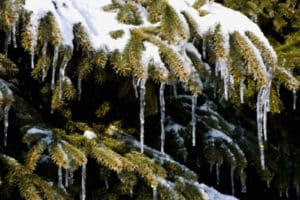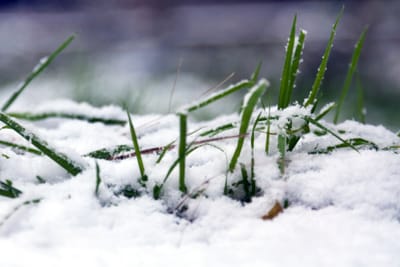While winter’s harsh weather drives a chill through your bones, it’s also hard on your landscape. Prepare your garden for winter in the North, with its freezing temperatures and howling winds, and you increase the chances that your garden avoids winter damage. Before you go inside to hunker down for cold weather, consider the following winter lawn and garden tips to prep for winter in the North.
Winter lawn care in North
Cut your lawn to 1.5 to 2 inches, and keep it at that height throughout the winter months. Remove all fallen leaves and debris from the lawn, which will reduce the chance that accumulated foliage becomes trapped underneath snow and suffocates your lawn. Keeping the lawn clean also helps reduce the risk of snow mold come spring and prevents vole damage. Prior to the first fall freeze, fertilize your lawn with a food that is high in phosphorus and potassium, which will encourage root development.
Clean out garden beds
Prepare your garden beds now to help ensure spring blooms. Remove and compost spent annuals and prune perennials that have entered dormancy. Cut back perennials that have entered dormancy to within 4 to 6 inches from the ground. Exposed stems offer plants some insulation during cold weather. If you’ve had trouble with foliage disease this past spring and summer, bag and throw away the foliage, rather than composting it. Avoid cutting back perennials before they have shut down for winter, as cutting back prematurely can cause the plants to put on new growth, which is susceptible to freeze damage.
Mulch garden beds
Mulching perennials and small shrubs, such as roses, helps protect their roots during the winter months and prevents a weed outbreak come spring. Around the base of each plant, apply 4 inches of wood chips or compost. Water the mulch in place once you finish.
Water evergreens prior to freezing
While you want to avoid watering most plants in your garden prior to the first freeze, evergreens require some extra moisture before the ground hardens. Because they don’t go dormant, evergreens continue to lose moisture from their foliage throughout the winter months. A deep watering before the first freeze allows them to hydrate, which helps prevent winter damage to foliage and branches.
Shield vegetation from animal feeding
During the winter months when food sources are lean, pests such as rabbits, mice, voles and even deer will feed on the branches of trees and shrubs. When feeding occurs at the base of trees, the damage can be fatal. Shrubs can also become comprised by excessive feeding damage. Protect shrubs by encircling them with wire mesh netting and guard trees from damage with plastic tree guards.


